

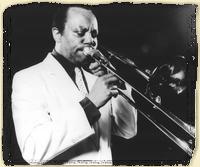 The original man in terms of the modern jazz trombone. Not much I can add to the volumes written about J. He is a picture of modesty and he is a frequent participant in his own email mailing list! How's that for accessible?! There is a great JJ site run by the mailing list administrator at http://www.jjjohnson.org/mailing-list/
The original man in terms of the modern jazz trombone. Not much I can add to the volumes written about J. He is a picture of modesty and he is a frequent participant in his own email mailing list! How's that for accessible?! There is a great JJ site run by the mailing list administrator at http://www.jjjohnson.org/mailing-list/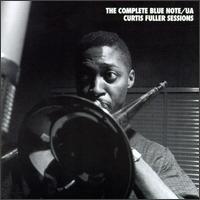 Curtis Fuller, coming of age in the 1950's is the embodiment of trombone excellence in the hard bop era. If JJ taught us how to run with the wolves, and he did, Curtis taught us to swing hard and soulfully. My childhhod buddy Chuck Royal introduced me to Curtis, he was trying to cure me of some un-hip influences. It worked! Curtis did it. The first Curtis I knew was on Blue Train, and I swore he was playing a valve trombone, it was so clean and fluid. At an important moment in my life I saw Curtis at the Ladies Fort in the East Village, playing quartet. Before that day, I was lucky if I ever improvised three notes in a row that made sense, after that day, I was on my way! God bless Curtis Fuller.
Curtis Fuller, coming of age in the 1950's is the embodiment of trombone excellence in the hard bop era. If JJ taught us how to run with the wolves, and he did, Curtis taught us to swing hard and soulfully. My childhhod buddy Chuck Royal introduced me to Curtis, he was trying to cure me of some un-hip influences. It worked! Curtis did it. The first Curtis I knew was on Blue Train, and I swore he was playing a valve trombone, it was so clean and fluid. At an important moment in my life I saw Curtis at the Ladies Fort in the East Village, playing quartet. Before that day, I was lucky if I ever improvised three notes in a row that made sense, after that day, I was on my way! God bless Curtis Fuller. 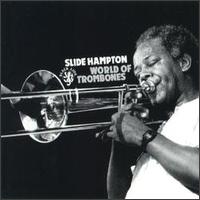 If JJ, even retired is still the king, Slide is the Prime Minister. He has applied all that came before him and placed the trombone on secure footing in the Coltrane and post-Coltrane era of harmony. Slide is a great arranger and is a master of of the mechanics of our music. Slide is almost single-handedly responsible for raising the bar for today's trombonists. Slide's World of Trombones was an incubator of young talent in the 70's and 80's Clifton Anderson, Steve Turre, Clifford Adams, Papo Vasquez, Clarence Banks, Earl McIntyre, Doug Purviance, Janice Robinson, whew! Slide is still going strong!
If JJ, even retired is still the king, Slide is the Prime Minister. He has applied all that came before him and placed the trombone on secure footing in the Coltrane and post-Coltrane era of harmony. Slide is a great arranger and is a master of of the mechanics of our music. Slide is almost single-handedly responsible for raising the bar for today's trombonists. Slide's World of Trombones was an incubator of young talent in the 70's and 80's Clifton Anderson, Steve Turre, Clifford Adams, Papo Vasquez, Clarence Banks, Earl McIntyre, Doug Purviance, Janice Robinson, whew! Slide is still going strong!For me, these individuals have had the biggest hands-on impact on my musicianship
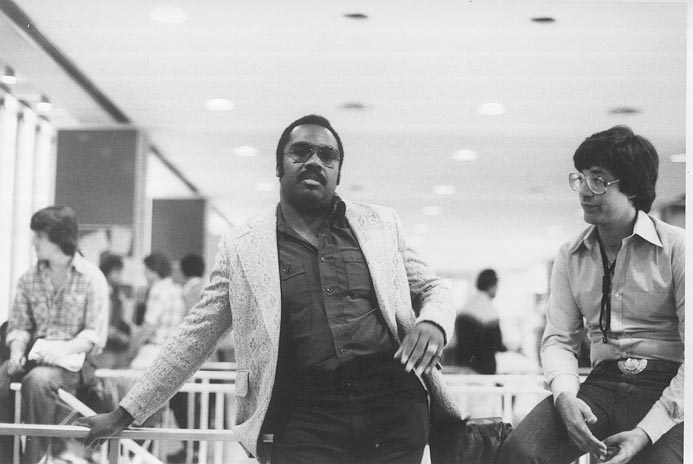 Nathan Davis has been at the University of Pittsburgh for(ever)over 25 years. When I was a student at Carnegie Mellon, a baritone saxophone player from the band at Pitt recruited me. I couldn't have been more shocked when I got there. The Carnegie Mellon band was typical of most college bands, even today, playing in the Swiftius, Altius, Fortius style that meant playing the most overwritten and overbloated scores availble. At Pitt, at least half of the book was head arrangements. Head arrangements! We would play the melody then solo. Wow! We played Stablemates and Dat Dere and Joyspring and Milestones. I learned so many tunes and so much about the difference between improvised music and big band charts. Nathan took us on the road to Birmingham and New Orleans. Man that was great.
Nathan Davis has been at the University of Pittsburgh for(ever)over 25 years. When I was a student at Carnegie Mellon, a baritone saxophone player from the band at Pitt recruited me. I couldn't have been more shocked when I got there. The Carnegie Mellon band was typical of most college bands, even today, playing in the Swiftius, Altius, Fortius style that meant playing the most overwritten and overbloated scores availble. At Pitt, at least half of the book was head arrangements. Head arrangements! We would play the melody then solo. Wow! We played Stablemates and Dat Dere and Joyspring and Milestones. I learned so many tunes and so much about the difference between improvised music and big band charts. Nathan took us on the road to Birmingham and New Orleans. Man that was great.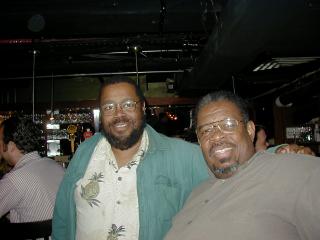 Every trombonist my age learned the solo on the J.B.'s Doin' it to Death. And when I say the solo, I don't mean either of Maceo Parker's two solos! Fred taught all of us how to play funk, and how to structure a solo like a conversation. Then we found out Fred could play any kind of music and this blew our minds. I was fortunate to finally meet Fred Wesley, and this phot is the proof.
Every trombonist my age learned the solo on the J.B.'s Doin' it to Death. And when I say the solo, I don't mean either of Maceo Parker's two solos! Fred taught all of us how to play funk, and how to structure a solo like a conversation. Then we found out Fred could play any kind of music and this blew our minds. I was fortunate to finally meet Fred Wesley, and this phot is the proof. 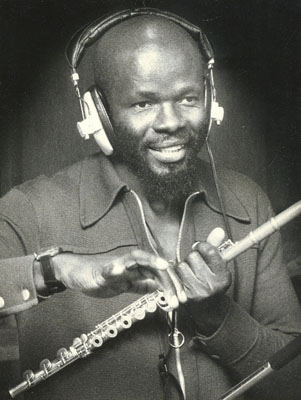 Makanda is one of the few individuals that I formally studied with. Sometimes a lesson with him was like a visit to the dentist. I have no idea what his teaching style was like with students with fragile personalities, but with me he was like a drill sargent. Tough love indeed! The chain of chance brought me to Makanda. I was doing nothing im music and went to see my friend, Geri Allen, at the old West End by Columbia University. I met one of the guys behind the classic Sounds of Sexy Soul TV-only LP (remember the commercial? "That's a fantastic album man, let me borrow it. No my brother," said the guy from Spike Lee's She's Gotta Have It, "You/ve got to buy your own!" It turns out my old friend James Patterson was one of the mostly Columbia U. B-School brothers behind the record. They were jazz fans and invited Makanda to come over and rap ( rap in the old sense) with them about the state of the music business. There I met Makanda and started to play in CAAMO for him. There is a nice site concerning Makanda. His early passing in 2001 was a severe shock to all of his friends and fans.
Makanda is one of the few individuals that I formally studied with. Sometimes a lesson with him was like a visit to the dentist. I have no idea what his teaching style was like with students with fragile personalities, but with me he was like a drill sargent. Tough love indeed! The chain of chance brought me to Makanda. I was doing nothing im music and went to see my friend, Geri Allen, at the old West End by Columbia University. I met one of the guys behind the classic Sounds of Sexy Soul TV-only LP (remember the commercial? "That's a fantastic album man, let me borrow it. No my brother," said the guy from Spike Lee's She's Gotta Have It, "You/ve got to buy your own!" It turns out my old friend James Patterson was one of the mostly Columbia U. B-School brothers behind the record. They were jazz fans and invited Makanda to come over and rap ( rap in the old sense) with them about the state of the music business. There I met Makanda and started to play in CAAMO for him. There is a nice site concerning Makanda. His early passing in 2001 was a severe shock to all of his friends and fans. No one individual has had a greater impact on me as a composer and jazz orchestra arranger than Charles. When I was a high schooler, I used to listen to 1180 AM WHAM in Rochester, NY late at night via ionispheric skip. The overnight DJ was Harry Abraham. The show was "The Best of All Possible Worlds" (If you are interested take a look at this letter Harry sent to Paul Baker in the '70's.) Harry managed to play some very hip music on a commerical radio station, including Charles Tolliver. I know thats where I first heard his composition Plight. BTW, the first notes on Plight are by Jack Jeffers! I have been blessed to become good friends with Charles, and to work with him every so often. Tolliver's Travels is my humble tribute to him and the NY music scene of the '70s. Charles still operatesStrata-East Records
No one individual has had a greater impact on me as a composer and jazz orchestra arranger than Charles. When I was a high schooler, I used to listen to 1180 AM WHAM in Rochester, NY late at night via ionispheric skip. The overnight DJ was Harry Abraham. The show was "The Best of All Possible Worlds" (If you are interested take a look at this letter Harry sent to Paul Baker in the '70's.) Harry managed to play some very hip music on a commerical radio station, including Charles Tolliver. I know thats where I first heard his composition Plight. BTW, the first notes on Plight are by Jack Jeffers! I have been blessed to become good friends with Charles, and to work with him every so often. Tolliver's Travels is my humble tribute to him and the NY music scene of the '70s. Charles still operatesStrata-East RecordsOf great musicians I haven't worked with, the biggest influences that aren't obvious (like Monk, Ellington, Basie, Miles, Mingus, etc)